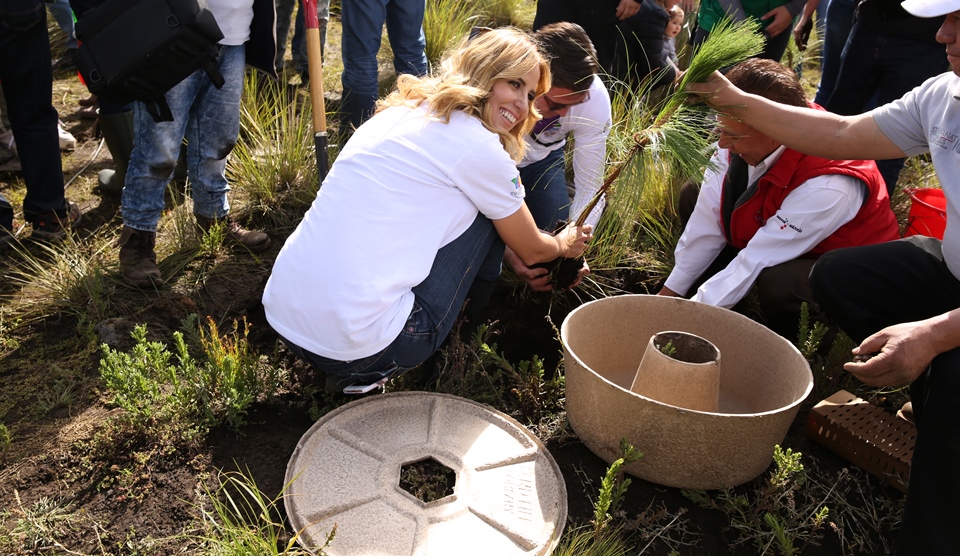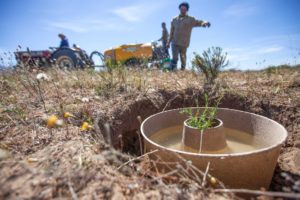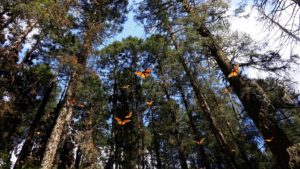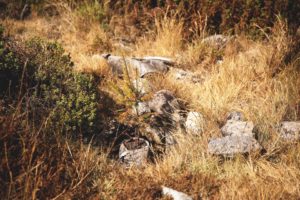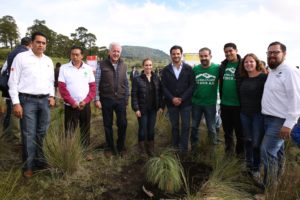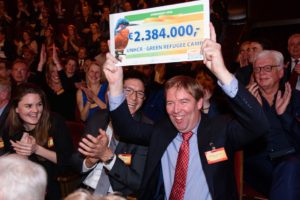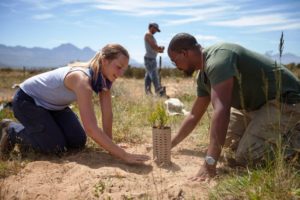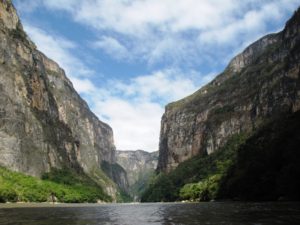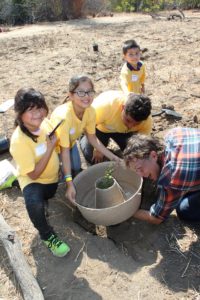Environmental degradation is one of the “greatest environmental challenges of our time,” according to the United Nations. Often caused by human industry and agriculture, environmental degradation is when lush land turns to desert. A total of 2 billion hectares of the earth’s land is degraded, which is an area larger than the surface of the USA and China combined.
The most straightforward solution to degraded land is reforestation, but when soil is dry and crusty, the survival rate for seedlings is dismal. A biodegradable cardboard doughnut, developed by the Amsterdam-based Land Life Company and known as the Cocoon, is changing that.
The results are pretty incredible, and it couldn’t be any easier to use. All you have to do is set it up, plant a seedling, walk away, and a tree will grow.
“You’re looking at 400 gallons of water for every single tree, versus the 10 gallons we use for the Cocoon,” says Land Life’s head of marketing and communications, Charlotte Jongejan. “Cost-wise, that’s $60 to $90 for a drip-irrigated tree and $10 to $12 for a Cocoon tree. Depending on cost of seedling and where you’re planting, labor and transportation costs could be higher or lower,” she adds.
In Mexico, the planting that took place from May through to September 2016 was a great success. Eight months after the start of the Monarch Biosphere Reserve Restoration Project in the Michoacan mountains, 93% of the new oyamel forest planted with the Cocoon is thriving thanks to the dedication and hard work of the local communities.
The Monarch Butterfly is one of nature’s most mysterious creatures. Every year, they migrate 4,000 miles from Canada to the mountains of northern Mexico, in a four generation cycle. How the children and grandchildren of each generation find their way has been studied at length but no definitive answer has been found.
Since 2004, monarch populations have been in an alarming decline – a combination of illegal logging, wildfires and droughts severely damaged their habitat, with big empty patches in the once-dense oyamel (fir tree) forest. In 2004, an estimated 550 million butterflies completed the winter migration, while in 2013 only 33 million arrived. Further, between 2012 and 2013, there was a 44% decrease in the size of the butterflies’ winter sanctuary forest in Michoacán.
In 2015, Land Life joined forces with WWF Mexico, the Mexican government and local community organisations to restore the Monarch Biosphere Reserve. When they started, they weren’t sure what the outcome would be. Previous efforts to replant oyamel trees in the area had limited success, with seedling survival below 15%.
This is some of the toughest land to restore due to the steep slopes, lack of rain and fertile soils. The success of this project is attributed to the protection and support the Cocoon offers the seedlings in the first crucial 6 months of life. Thanks to the Cocoon, fertile soil around the seedling stays intact when rain does fall, allowing the seedling to absorb moisture to its root system instead of being flushed away.
Land Life representatives say they are “blown away” by the motivation of the people in the local community of Nicolas Romero to restore the pristine mountain tops, the dense oyamel and, ultimately, the Monarch to these parts. On top of the reforestation efforts, the local citizens have set up a team of volunteers who work twelve hour shifts patrolling the nature reserve to stop illegal logging in the reserve.
Later this year, Land Life will start producing Cocoons on location. Helped by a Fast Track to Innovation grant from the European Commission, the company is finalizing a modular factory model that can be developed and replicated wherever Cocoon technology is needed. The first factory will open in Mexico later this year, and others in North America, the Middle East, and potentially Africa are expected to follow.
“Our goal is to reduce logistics and create more of a closed loop, in terms of sourcing the paper pulp and making sure everything is local,” Jongejan says. “Local employment is important for us. It’s a logical next step, now that we’ve scaled and production is growing—it’s something founder Jurriaan Ruys has wanted from the beginning.”
In February of 2017, Land Life Company announced that it had raised 2.4 million Euro to ramp up land restoration globally in 2017. They have completed their Series A investment round: Postcode Lottery Green Challenge Fund (Amsterdam), SystemiQ (London), Vectr Ventures (Hong Kong) and the founders have invested a total of EUR 2.4 million in the company.
In February 2017, Land Life and United Nations High Commissioner for Refugees (UNHCR) received a grant for a similar amount from the National Postcode Lottery to execute the Green Refugee Camp project. Starting in the Minawao camp in northwestern Cameroon, the project will innovate on and improve the sustainability of core functions of the UNHCR, such as the provision of food and shelter, restoring land through reforestation and how it addresses the long-term impact of refugees on a host community.
This investment will allow Land Life Company to further develop its low cost production of the patented Cocoon tree planting technology and build new production hubs in China and Mexico (their largest market). Land Life Company’s Cocoon technology is a sustainable, scalable and low cost solution to successfully grow trees in dry and degraded soils without irrigation.
in 2017. Furthermore, the company will invest in tech research including satellite monitoring of trees and strengthen local presence for large scale land restoration projects in key markets including China, Mexico, Africa and the USA. The success of the current restoration work in the Monarch Butterfly habitat isn’t the only good restoration news coming from Mexico.
Recent figures from the Instituto Nacional de Estadistica (INEGI) suggest that Mexico has lost almost 50% of its native forests due to logging and clearance for farming and settlement. The results are visible across the country and felt most acutely by the poorest rural communities. Barren and abandoned farmlands, soil erosion, increased air pollution and water and food scarcity are all in evidence.
But all this is starting to change. In 2008 Mexico announced an aspirational goal to cut emissions by 50% by 2050. And in 2009 it adopted a Special Climate Change Program to fight climate change, promote green economic growth, improve water management and restore nature and biodiversity. Part of this program includes reforesting one million hectares of degraded land (or 18 million trees) before 2018, and success is in sight.
Data released by the UN Environment Program (UNEP) puts Mexico in an admirable 4th place worldwide for the number of trees planted since the “Billion Trees Campaign” began in 2007.
“We invested in Land Life because we believe in creating value that is both good for the world and for business,” explains Alan Chan (Managing Partner at VECTR Ventures)
“Land restoration plays a critical part in reversing many of the world’s largest problems and we are proud to support Land Life in this goal. Asia has huge opportunities for sustainable land restoration and we plan to play a strong role in driving towards a better and more sustainable future,” he continued.
Today, Land Life Company is active in more than 20 countries worldwide restoring degraded land, working towards restoring all 2 billion hectares of degraded land worldwide. Land Life Company was founded in 2014 by former McKinsey partner Jurriaan Ruys and the founder of Bugaboo International, Eduard Zanen.
All photos courtesy of Land Life, unless otherwise noted.
See full Fast Company article by John Converse Townshend.

